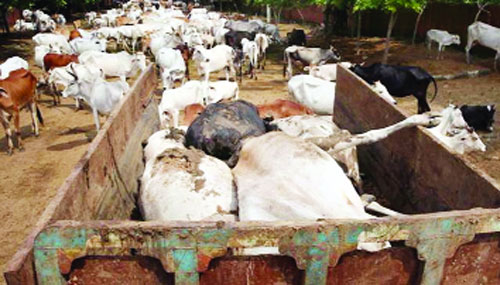Nitish Kumar’s political move of building mega gaushalas has once again pointed out that superficial concern for bovines is proving to be detrimental for both the breed and the breeder essential to agriculture and dairy production
Bihar Chief Minister Nitish Kumar has discovered his love for cows. He is planning to build a mega gaushala for the abandoned cows in Patna. He said the abandoned cows obstruct traffic and eat plastic and other hazardous material and die. Kumar’s new found interest ingomata is a matured political move to counter the Hindutva forces.
A mega gaushala will solve Patna’s perennial problem of traffic obstruction due to too many cattle on the roads, said Nitish Kumar. He said, he would build more gaushalas in other places. If hisgaushala politics clicks, Nitish Kumar will further consolidate his votes in Bihar and step out of Bihar for a bigger political gain when opposition parties are still searching for a credible leader to face the BJP’s juggernaut. Whether Nitish Kumar’s gomata issue will turn the table against the Hindutva leaders.
In the coming years, more politicians are likely to take up Hindutva issues. Rahul Gandhi has also shown interest in the Bhagavad Gita and the Upanishad. TheHindutva brigade will have to be more purposeful in addressing the basic needs of the bovine family if they want to remain in the scene. Availability of green fodder, water and timely veterinary care are the three basic requirements for the cows to survive. If milk procurement centres are not there the farmers in remote areas find it difficult to earn from cow rearing. There are reported incidents of artificial milk in the market which is a potential threat to gomata’s reputation and public health. the survival of cows.
Hindus generally abandon their cows when the cows no longer give milk. Many people buy milch animals for Government subsidy and sell it after consuming the subsidy. The cost of maintenance of cow which includes veterinary care is very high. A cow eats minimum fodder worth Rs120 to Rs160 per day. If natural green fodder is not available in the village it becomes difficult for the villagers to keep cows.
Once cow was an asset for small and landless villagers. Today it has become a liability. Veterinary services are available in 30 per cent of the villages. No villager wants a cow to die in his house. 90 per cent of veterinary graduates want to work for insurance companies, banks and other public sector offices. Efforts should be made to attract veterinary doctors to work in villages. The Government should consult veterinary experts, farmers, senior bankers and consumers while planning for wellbeing of cows.
10 year back, Sonai Rajan, 47, from Boshi village of Adilabad district had 30 cows. He had sold the cows due to non-availability of green fodder in the village. “I managed for two years by taking my animals 30 km away to a place where fodder was available,” said Rajan. When ground water is depleted and the water bodies are either encroached or polluted gomata has little scope to survive. Subsidy and loan waivers have made villagers idle according to Rajan. Government should create right environment in villages so that villagers could earn income from dairy farm. If people earn their livelihood with sincerity and hard work their self-respect is restored. Milk route should connect each Indian village and prompt payment should be made to farmers.
Green fodder grows when the water table, lakes, ponds and wells in the villages remain healthy. The soil should have moisture holding capacity. In the last two and half decades there were wanton destructions of water bodies across the country. Over exploitation of ground water in Punjab in the last three decades has depleted water table to an alarming level. Now, Punjab Government spends public money to increase the ground water. Such kind of destroy and build approach should be nipped at the bud. Many industries also over exploit and pollute ground and surface water which adversely affects animal husbandry sector. India’s manufacturing sector should adhere to the environmental norms. Errand industries should not damage other sectors. The cost of damage is far bigger than their contribution to Gross Domestic Product. The present kind of growth has damaged sustainable development models world over.
In order to address thegomata problem, the Hindutva brigades should safeguard the water bodies in their villages and prevent unsustainable use of ground water. Awareness among people should be created about the bio-diversity, water conservation and about the native cow breeds which are drought resistant and need low maintenance cost. Researchers have found the milk quality of native breed better than the imported breeds. Ongole breed of East Godavari district of Andhra Pradesh has boosted animal husbandry sector in Brazil and the US. We have lost many of our native breeds due to sheer neglect and ignorance. Indian political class converge to promote animal husbandry sector which has potential to generate huge employment.
(The writer is a freelance commentator)


























